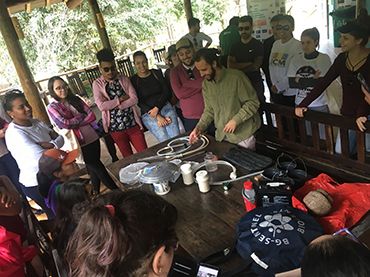Towards more equitable health research
A global network, coordinated by Oxford University, is helping to ensure health research benefits low-income countries.
 Workshop instructor showing different types of arthropod-trapping systems.
Workshop instructor showing different types of arthropod-trapping systems.
Ninety percent of global health research benefits only 10% of the world’s population. The Global Health Network, led by Professor Trudie Lang from the Nuffield Department of Tropical Medicine, works to shift the balance.
‘Most health research is funded and managed by rich countries,’ explains Professor Lang. ‘Much of it is directed towards ‘first world’ diseases such as cancer or heart disease; infectious disease, and illnesses caused by poverty, struggle to win investment as such research is not as profitable.’
‘In low-income countries there are stark gaps in evidence and data is needed to tackle disease,” she continues. “The Global Health Network aims to create a more equitable research environment and ensure that research supports the needs and interests of poorer countries.’
The Network was established in 2010 and is now a partnership of health organisations and institutions in over 190 countries. It works to identify the barriers to research (such as skills gaps or lack of access to methods and protocols) and develop and share strategies to overcome them (such as guidance and training).
‘Crucially, it’s about building the expectation that research can, and should, be undertaken in low-income settings – it’s not all about conducting big trials or developing drugs. Finding out how to better engage with mothers and babies or disseminate public health messages can be vital to improving health outcomes,’ says Lang.
Building the skills and knowledge of researchers to ensure sustainable research capacity is a key goal of the Network. So far over two million online trainings have been delivered as well as over 100 face-to-face workshops. The Network also uses a state-of-the-art digital platform to host resources and connect researchers, enabling collaboration between partners in different parts of the world. Approaches developed in Malawi, Peru and the Gambia for instance have been adapted for research in Pakistan and Nepal.
The digital platform has now been registered as a social enterprise which will charge fees for courses and resources to those able to pay, to support free access for those who cannot as well as research activities in low-income countries. ‘Donors and big research institutions really love and benefit from our work, but they often don’t have mechanisms to support this type of research-enabling activity,’ says Lang. ‘We hope the social enterprise will help to fill this gap.’
COVID-19 pandemic
The current pandemic has underlined the importance of the Network which has used its established partnerships to quickly scale-up COVID research.
The COVID-19 Research Implementation and Knowledge Hub established in January 2020, is now being used by researchers across the world, and by organisations such as the World Health Organisation (WHO), Gates Foundation and others to engage with researchers in poorer countries. It responds to WHO’s call for low-income countries to be the generators rather than the recipients of health research and has worked with partners to identify their COVID research priorities.
Lang believes that the virus demonstrates how much the West can learn from low-income countries. ‘Talking virtually to our partners every day, I’m seeing how different countries are tackling the pandemic,’ she says. ‘Rwanda has done great things with clear, consistent, public health messaging and grassroots organisation, for instance. Resource-limited countries live with emergencies and early mortality, so are applying their experiences to COVID – and are open to listening, learning, and collaboration.’
She adds: ‘The Global Health Network is enabling data collection in places where it’s normally difficult to do research, and breaking down silos between countries, organisations and research topics. It’s a privilege to be involved in facilitating this process and I’m constantly awed by the drive, determination, and ability of our partners to mobilise knowledge on public health in places where high disease burdens deliver such a toll.’
Trudie Lang is Professor of Global Health Research at the Nuffield Department of Medicine, Director of the Global Health Network, and Senior Research Fellow, Green Templeton College, University of Oxford
Funders:
- The Bill and Melinda Gates Foundation
- The European Union
- Wellcome Trust